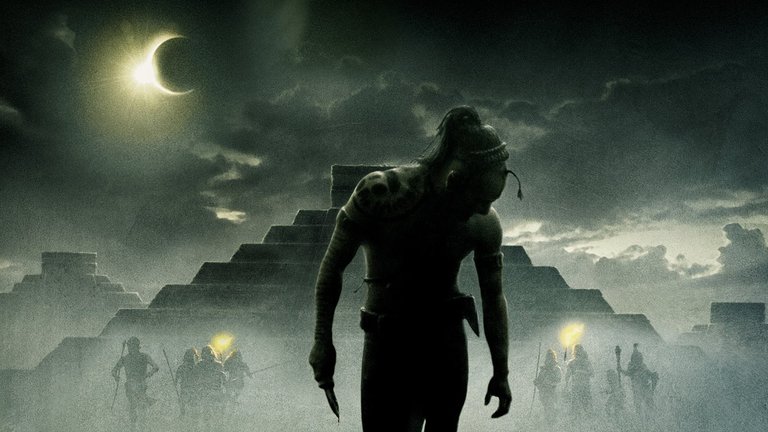Film Review: Apocalypto (2006)

In 2006, Mel Gibson found himself at the lowest point of his career, facing intense backlash and a fall from grace due to a drunk driving incident and controversial anti-Semitic remarks. However, during this tumultuous period, Gibson directed a film that could be considered his magnum opus: the period action-adventure epic, Apocalypto.
The film's plot is set centuries ago in the Yucatán jungle, following the story of Jaguar Paw (played by Rudy Youngblood), a member of a simple, happy tribe. Their idyllic existence is shattered when Mayan warriors led by Zero Wolf (played by Raoul Trujillo) raid their village, killing and enslaving the villagers. Jaguar Paw manages to hide his pregnant wife, Seven (played by Dalia Hernández), and young son, but is captured and brought to the great Mayan city, where he is, together with hundreds of other captives, to be part of a mass human sacrifice ceremony. As he is about to be killed, a solar eclipse provides a temporary reprieve, allowing Jaguar Paw to escape and embark on a desperate journey back to the jungle to reunite with his family while being mercilessly pursued by the Mayan warriors.
Gibson's passion for historical accuracy is evident in Apocalypto, as he invested significant resources to bring the Maya civilisation back to life, particularly in the scenes depicting ancient pyramids and the bustling Mayan cities. Taking a cue from his previous film, The Passion of the Christ, Gibson had the characters speak in Yucatec Maya, the language closest to the version spoken at the time, immersing the audience in the ancient world.
By setting the film in the New World before contact with the Old World, Gibson had more creative freedom to express his ideas without facing criticism over anti-Semitism or racism. He begins the film with a quote from historian Will Durant, suggesting that civilisations begin to collapse from within, which can be interpreted as an allegorical critique of modern Western civilisation.
Gibson's depiction of the Mayan city as grand on the outside but rotten within reflects this view. The people are decimated by disease, crops are failing, and many Mayans look emaciated, while the elite appear decadent and willing to maintain their status quo through increasingly barbaric human sacrifice rituals. The film suggests that the Maya's collapse was caused by their own actions, such as deforestation for the construction of pyramids and temples, leading to soil erosion and crop failure.
Gibson's skills as an action director shine through in Apocalypto, as the film is essentially a chase movie with a simple plot that allows for historical exposition and commentary on the state of modern affairs. The action sequences are energetic and exciting, taking inspiration from 1980s genre classics with similar settings like The Emerald Forest and Predator.
Despite the film's extreme violence, which at times resembles Holocaust imagery, Gibson manages to justify the gore in the context of pre-Columbian Mesoamerica, avoiding the same controversies that surrounded the extensive bloodletting in The Passion of the Christ.
The cast, led by American actor Rudy Youngblood and composed of American, Canadian, and Mexican actors of native descent, delivers impressive performances, with only Mexican actor Raoul Trujillo later achieving prominent roles in Hollywood films and television.
Apocalypto is an impressive achievement that forced even Gibson's harshest critics to acknowledge his directorial skill and passion for the project. The film's box office success allowed Gibson to slowly recover his reputation and career after hitting rock bottom.
However, the film's ending, which introduces the Spanish conquistadors as a symbolic representation of Christianity confronting the pagan Mesoamerican world, is a weak point. This not only muddies Gibson's message but also highlights another glaring anachronism: the mixing of Mayas with Aztecs, a civilisation that appeared roughly 600 years later. Since most casual viewers today base their knowledge of history on Hollywood films, Apocalypto, being the first and so far the only major Hollywood film dealing with the Maya, is going to be responsible for historical misconceptions among future generations.
Despite this flaw, Apocalypto remains a remarkable cinematic achievement, showcasing Gibson's talent as a director and his ability to immerse audiences in a long-lost world. While the film may contain historical inaccuracies, it serves as a testament to Gibson's artistic vision and his willingness to take risks in the face of personal and professional adversity.
RATING: 8/10 (+++)
Blog in Croatian https://draxblog.com
Blog in English https://draxreview.wordpress.com/
InLeo blog https://inleo.io/@drax.leo
Hiveonboard: https://hiveonboard.com?ref=drax
Rising Star game: https://www.risingstargame.com?referrer=drax
1Inch: https://1inch.exchange/#/r/0x83823d8CCB74F828148258BB4457642124b1328e
BTC donations: 1EWxiMiP6iiG9rger3NuUSd6HByaxQWafG
ETH donations: 0xB305F144323b99e6f8b1d66f5D7DE78B498C32A7
BCH donations: qpvxw0jax79lhmvlgcldkzpqanf03r9cjv8y6gtmk9
Posted Using InLeo Alpha
An interesting movie